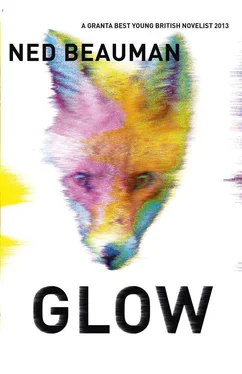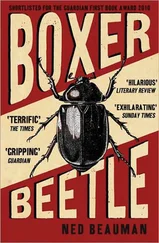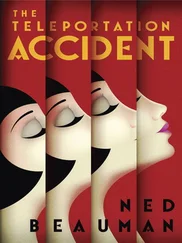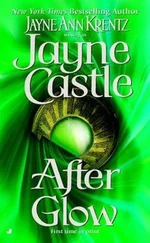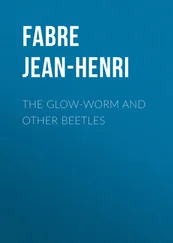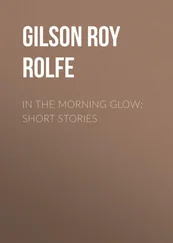Beyond, there’s yet another purposeless, rectal yard, and this one is even less inviting. Slumped against the wall to the right is a beach of junk rising almost to chest height: tyres, cardboard, styrofoam, paint cans, bin bags, telephone directories, computer keyboards, fake flowers, broken wooden pallets, and a surprisingly extensive library of what look like books of carpet samples.
All that, and the Bic flame of a fox’s tail, flickering down under the morass as Raf watches.
He hops to the ground and starts pulling stuff aside to make a tunnel, smelling stale rainwater and musty glue and maybe a few dead rats down at the bottom. For a while he can’t work out where the fox could possibly have gone, but then, at last, he finds it: a small cavity in the brickwork, with a square collar of missing rivets, that might once have had something to do with ventilation or plumbing. On any other day, if someone bet him he could fit through it, he wouldn’t take that bet.
He lies down on the ground, hunches his shoulders, and jams himself into the hole. His head bumps against a barrier on the other side. Here in the dark there’s evidently lots of vertical space but not much horizontal space. In other words, he can only get into the hole supine, but he can only get past the hole upright. He feels like Santa trying to climb back up a particularly brutal flue, wishing he had a series of necks and waists all the way down his body.
Inch by awkward inch, Raf snakes inside, until at last he’s on his feet again. The cold corridor is too tight to turn around in, so he’s stuck facing forward. And because he’s still too cautious to switch on the torch he brought, he can’t see a thing, and instead gropes along the sides as he crabwalks to the left. He has an odd sense of being trapped backstage in the middle of a play.
Quite soon, on the exterior wall, his fingers find a ladder — but not a real ladder with metal rungs, just a column of wooden slats bolted at regular intervals into the brick. Still, a ladder has to go somewhere. So he starts climbing.
By the time he’s about twelve feet up, he’s relaxed into the rhythm of hand over hand, and he’s trying to decide how much farther it would be sensible to climb before giving up and coming back down. Then, as if he weren’t distracted enough already, he realises he can hear music from somewhere. So when he reaches for the next slat, and it isn’t there, it catches him totally off balance.
He topples backwards. Somehow, the wall behind him yields. And light explodes in his eyes.
Fitch looks down at him. ‘Oh, hi,’ he says.
Raf is lying in a fridge. Or, in fact, he’s lying half in a fridge and half out of it, just like when he was squeezed part of the way through that hole in the wall. From the thighs down he’s still dangling on the other side. The fridge, he realises, must be open at the back, operating as a hatch between this kitchen and the space behind the wall. In terms of props and set design, everything else looks just as it did when Belasco gave him the tour of the core scenario installation, although of course he hasn’t seen it from this angle before; light streams in through the small window over the sink, toasted to a high-colour temperature to suggest daylight. Only the foxes are new.
There are at least a dozen of them hanging out here, some on the floor and some on the kitchen table and some out in the corridor. When you see so many in one place, that’s the first time you can get a real sense of how much they vary. One is stout and fangy, like a crossbreed with Rose or some other bull terrier; another is gymnastic, surgical, almost arachnoid; another has a broad leer of a mouth to match a skull the shape of a flattened diamond. Raf is stricken to his ventricles by their gaze, their scent, their colour. The foxes, on the other hand, don’t seem intrigued by him at all.
Slathered from head to toe in damp grit, Raf shunts himself all the way out of the fridge and gets to his feet. ‘Am I safe here?’ he says.
‘For a minute,’ says Fitch. ‘Probably won’t be any more simulations until morning — real world morning.’
Not having paid much attention the last time they met, Raf now looks Fitch up and down with renewed interest. He’s only about five feet tall, with darkish skin even for a Burmese guy, and delicate, sombre features that contradict his demeanour. ‘I know you’re “Fitch” on Lotophage, but what’s your name, really?’ says Raf.
‘Win.’
‘Do Lacebark know who you are?’
Win tuts. ‘You a retard? Of course not! They don’t know I’m a chemist. They think I’m just an actor they hired to play a chemist. Otherwise why they still hunting me all over town?’ Interrupting his heavy Burmese accent is the occasional pronunciation that sounds distinctly American, giving his speech a cut-and-paste quality, and he has the syntax of someone who’s made a diligent study of English from coke rap and specialist messageboards.
‘And the guy in Zaya’s flat who answers to your name?’
‘Some asshole with nothing better to do.’
Raf began to understand all this the minute he saw that graph. Cherish has a fake chemist in a real kitchen, like a false real morel, while Lacebark — without even realising it — have a real chemist in a fake kitchen, like a real false morel. The guava juice incense burner is here because Win actually made it himself, but the passionfruit juice incense burner was in the kitchen in Camberwell Green because Cherish thought it would make her fake Win look more realistic to Raf. Perhaps it didn’t occur to her that by reproducing a minute detail that Lacebark would never have been able to get right on their own, she was bringing the two models so close together that the logic of her story got squeezed to death in between them. (After all, if Cherish had the real chemist and Lacebark had a fake one, then the two kitchens should have looked dissimilar, because Lacebark didn’t know Win personally and they were just guessing at his habits. It was only if Cherish herself was the counterfeiter that the two kitchens could have matched so exactly, because she knew Win well enough to build a near-perfect imitation of his workspace.)
‘What happens to the foxes when Lacebark are running simulations or showing people around?’ Raf says.
‘They hear anyone coming, they bail.’
‘They didn’t this time.’
‘They know you not a threat.’
‘How would they know that?’
‘Maybe they been watching you for a while.’
Raf thinks of the fox on the bus, the fox by the basketball court, the five foxes in the video. ‘Are they. .’ He hesitates. ‘Are they getting more intelligent?’
‘Don’t expect them to start talking. But, yeah, they are. The glo does that. They get more social. And they spatial memory gets better. I think maybe they start using light the same way they already use smell. They make these three-dimensional maps in they heads.’
‘You mean glo , the plant?’
‘Yeah. They love to eat that shit. And they come here because I feed it to them. You understand how glow made, right? Glow, the drug.’
‘No.’
‘Foxes metabolise the precursor in they bodies from the alkaloids in the plant. Then I purify it out of they excreta.’
Again Raf thinks of Isaac and his autogenous rocket fuel. ‘Wait, so glow comes from fox piss?’
‘And fox shit, yeah. Don’t look so surprised. How you think those Siberia shamans started getting high on fly agaric? You can’t just eat the mushrooms out of the ground — they toxic. So you wait for a reindeer to eat some and then you drink some reindeer piss.’ Fitch shoos a feathery-cheeked fox off a chair so that Raf can sit down. ‘Look, you obviously totally fucking clueless. Maybe I ought to start from the beginning.’
Читать дальше
